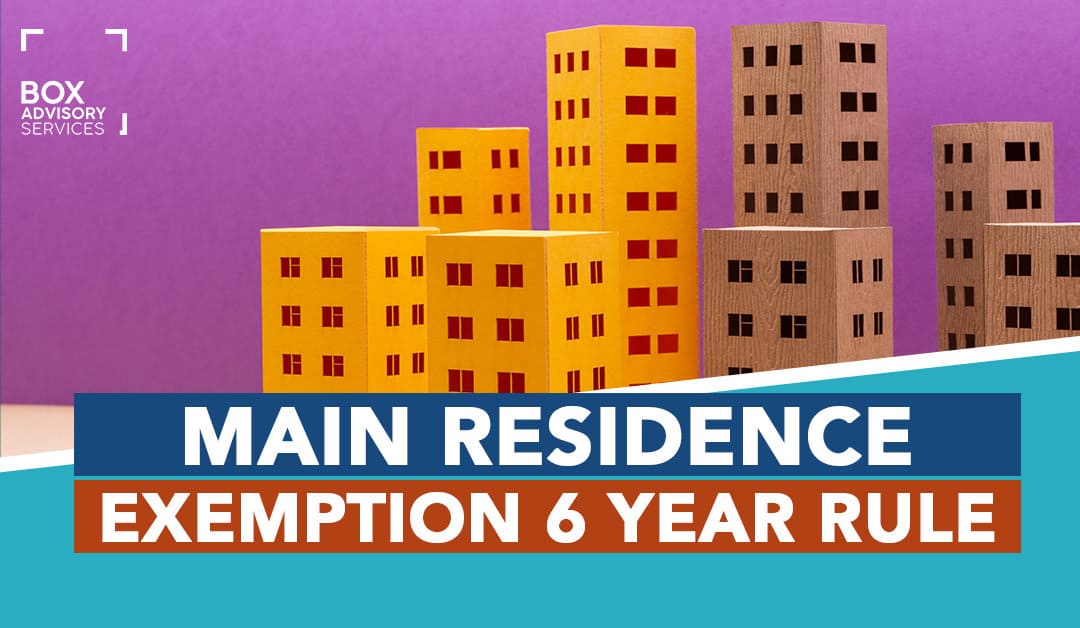
BY
|
Main Residence Exemption 6 Year Rule: The Essential Guide
If you’re new to the property investment sphere, being aware of the main residence exemption 6-year rule could help you avoid capital gains tax and save you thousands of dollars on the eventual sale of your investment property.
Yet, so many first-time investors remain uninformed of the benefits of the 6-year rule.
For example, some investors rent out their property immediately after purchasing it or don’t treat it as their PPOR – all factors that trigger capital gains tax.
To help you gain access to these benefits, we’ve compiled this ultimate guide to the main residence exemption 6-year rule.
What is Capital Gains Tax (CGT)?
Any profit on the sale of your investment property is considered a capital gain and needs to be declared on your annual income tax return. This is called capital gains tax or CGT.
Thankfully, the Australian Tax Office (ATO) offers several ways in which you can avoid paying capital gains tax. Understanding the guidelines set by the Australian Taxation Office is crucial for effectively managing your tax obligations. These exemptions include:
- The principal place of residence (PPOR) exemption
- The main residence exemption 6-year rule – which we will be discussing in this article
- The 50% CGT discount if you’ve held your property for 12 months or more before the CGT event, i.e. selling the property. A capital gains tax event occurs when an asset is sold or otherwise transacted, leading to a capital gain or loss.
- The six-month rule – this is when the ATO allows you to hold two PPORs if a new home is acquired before a purchaser disposes of the old one. Both properties will be treated as PPOR for up to six months in this case.
For more information on how to calculate CGT, check out these three simple methods here.
What is the Main Residence Exemption?
The Main Residence Exemption is a valuable tax exemption that allows homeowners to avoid paying capital gains tax (CGT) on the sale of their primary residence. This exemption is designed to provide relief to individuals who have lived in the property as their main residence for a certain period, typically at least six months. By claiming this exemption when the property is sold, homeowners can significantly reduce the amount of CGT payable, making it a crucial consideration for anyone looking to sell their home.
What Is a Principal Place of Residence (PPOR)?
Before delving into the main residence exemption 6-year rule, you should have an understanding of what constitutes as a principal place of residence.
As a general rule, the ATO exempts you from paying capital gains tax on the sale of your family home, otherwise known as your principal place of residence.
This is because you don’t generate an income from living in your home.
For your property to be considered a PPOR, you have to meet a few eligibility criteria:
- living in your family home for the full duration that you have owned it;
- keeping your possessions there;
- using the address to receive your postal mail; and
- having all the connected utilities in your name.
For property investors who do not necessarily plan on living in their investment property, knowing about the CGT 6-year rule before immediately renting it out is useful because you could qualify for an exemption. Understanding the implications of designating a property as a rental property versus a PPOR is crucial for maximising tax benefits.
Eligibility and Rules
To be eligible for the Main Residence Exemption, the property must have been the individual’s main residence for at least six months. This exemption can be claimed for a maximum period of up to six years, during which the property can be rented out or used for other purposes. However, it’s important to note that if the property is used to produce income, the exemption may be reduced or eliminated. Understanding these rules is essential for homeowners looking to maximise their tax benefits.
Eligibility Criteria
To qualify for the Main Residence Exemption, the following criteria must be met:
- The property must have been the individual’s main residence for at least six months.
- The individual must have owned the property for at least 12 months.
- The property must not have been used for business purposes or to produce income for more than six months.
- The individual must not have claimed the exemption on another property in the same financial year.
Meeting these criteria ensures that homeowners can take full advantage of the main residence exemption and avoid paying capital gains tax on the sale of their property.
What Is the Main Residence Exemption 6-Year Rule?
The main residence exemption 6-year rule allows you to treat your property investment, as if it was your principal place of residence, for a period of up to six years, whilst you rent it out. This means you can generate rental income without affecting your eligibility for the exemption.
In other words, just as property owners can sell their family home without paying CGT, you would be able to sell your investment property, within the six years, and be exempt from paying CGT. Understanding this rule’s capital gains tax implications can help you make informed financial decisions.
To qualify for the main residence exemption 6-year rule:
- your investment property must be considered as your PPOR before renting it out; and
- you won’t be able to use another property as your PPOR for the same period. This ensures that your capital gains tax liability is minimised during the period you rent out the property.
Capital Gains Tax Exemptions
There are several capital gains tax exemptions available to individuals, each designed to reduce the tax liability on the sale of a property. These include:
- The Main Residence Exemption: This exemption allows homeowners to avoid paying CGT on the sale of their primary residence.
- The 12-Month Ownership Discount: This exemption allows individuals to reduce their CGT liability by 50% if they have owned the property for at least 12 months.
- The 6-Year Rule: This exemption allows individuals to treat a property as their main residence for up to six years after moving out, even if it is rented out or used for other purposes.
Understanding these exemptions can help homeowners and investors make informed decisions and potentially save thousands of dollars in capital gains tax.
When You Need to Pay Capital Gains Tax
Capital gains tax is payable when a property is sold, resulting in a capital gain. A capital gain occurs when the property’s sale price is greater than the original purchase price. The amount of CGT payable depends on the individual’s tax rate and the amount of the capital gain.
In general, CGT is payable when:
- A property is sold, and the sale results in a capital gain.
- A property is used to produce income, and the income is not exempt from CGT.
- A property is sold, and the individual has not claimed the Main Residence Exemption or other exemptions.
Given the complexity of CGT, it is advisable to seek advice from a property tax specialist to ensure compliance with tax obligations and to take full advantage of available exemptions. This can help in effectively managing your tax liability and making informed financial decisions.
How Can You Take Advantage of It?
After the initial six-month period, you can move out of the property and rent it out for up to six years. This strategy particularly benefits those who own investment properties and want to maximise their tax benefits.
For example, suppose you are unable to reside in your home for some time due to work obligations out of state. In that case, you could opt to rent out your home to earn some extra money — all without prompting the need to pay capital gains tax upon the property’s eventual sale.
Example:
In 2014, Laura purchased her first property in Brisbane. It has been her main residence for the entire period that she has owned it, which totalled to four years.
In 2018, however, she was offered a new position at her company’s office in Sydney. The employment contract was valid for two years. She accepted the placement and moved to Sydney shortly after.
Her friend was looking for a roommate at the time, and Laura wasn’t ready to commit to purchasing a new home yet, so she decided to rent and move in with that friend. As a result, she didn’t treat any other house as her main residence.
She opted to keep her home in Brisbane and rent it out to earn some extra money.
Two years later, in 2020, she was offered a more permanent position at the Sydney office, which she accepted. As a result, she decided to sell her Brisbane home and permanently relocate. Through the application of the capital gains tax property 6-year rule, she was able to sell the property and claim the CGT exemption.
Consequently, she was not required to pay capital gains tax.
You may also choose not to rent it out and instead treat it as a holiday home. In either circumstance, you will be able to claim a capital gains tax exemption.
Another factor to note about the main residence exemption 6-year is that it resets each period that you don’t live in your PPOR and rent it out. Each time you move back home, the capital gains tax 6-rule restarts, provided that the time you are away doesn’t surpass the 6 years.
How Does the Main Residence Exemption 6-Year Rule Apply To Foreign Residents?
In 2017, the Australian Government announced the removal of the main residence exemption 6-year for foreign residents.
From 1 July 2020, even if you satisfy the requirements for the 6-year rule, if you are a foreign resident and you sell your main residence, you will not be eligible to claim the main residence CGT exemption. This means that the full amount of capital gains tax payable will apply to the sale of your property.
If you are a foreign resident and want to avoid paying CGT, you may want to consider delaying the intended sale of your main residence until you have obtained Australian residency for tax purposes.
Alternatively, if you’re considering moving overseas and becoming a foreign residence, you should consider selling the property before your departure.
Key Takeaways
If you are looking to reduce the amount of capital gains tax on the sale of your property investment, you may want to consider how the main residence exemption 6-year rule works.
To qualify for the main residence exemption, you’ll need to:
- hold the property in your name and not in a company or trust’s name; and
- ensure that your property remains your PPOR.
As long as you sell your property within six years of renting out, you can apply the CGT 6-year rule and qualify for the main residence exemption.
If you are unsure whether you qualify for the main residence exemption 6-year rule or you simply would like someone to provide you with tailored advice for your situation, you can consult with a qualified tax agent or accountant.
To find out how Box Advisory Services can help you, feel free to book a free consultation with us.
Sign up* to our monthly newsletter where we share exclusive small business and contractor advice!*
Disclaimer:
Please note that every effort has been made to ensure that the information provided in this guide is accurate. You should note, however, that the information is intended as a guide only, providing an overview of general information available to contractors and small businesses. This guide is not intended to be an exhaustive source of information and should not be seen to constitute legal or tax advice. You should, where necessary, seek a second professional opinion for any legal or tax issues raised in your business affairs.



